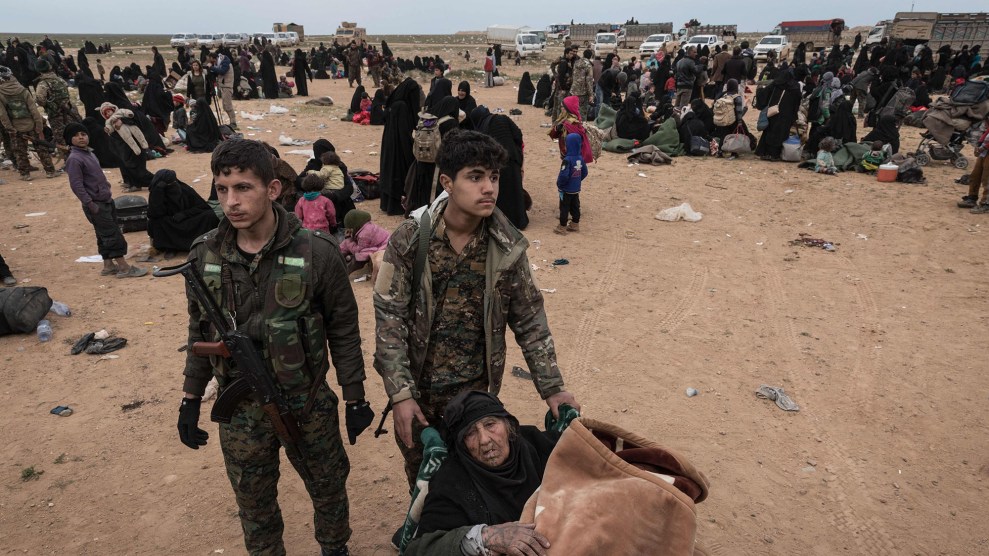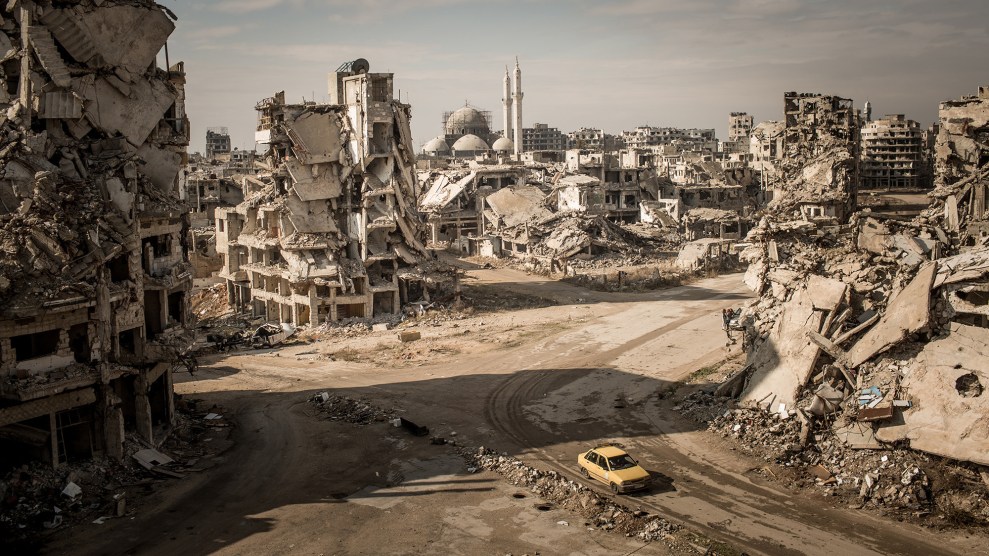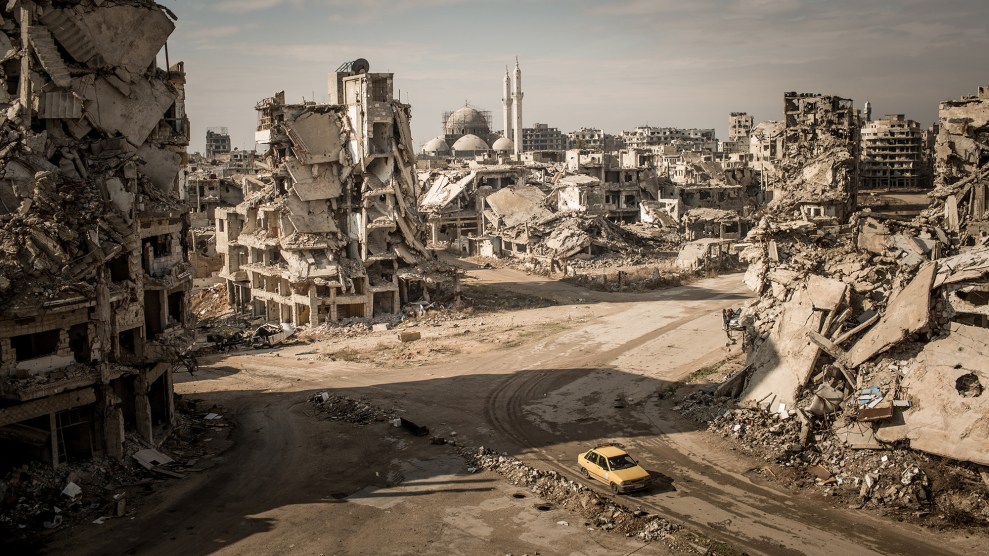
The Kurdish YPG of the coalition (Syrian Democratic Forces AKA SDF) taking thousands of women and children of Daesh jihadists (ISIS) out of Baghoz, the last jihadist stronghold in Syria, in trucks to drop them at Al Hol camp a few hours away. Chris Huby/ZUMA
This story is part of Shane Bauer’s investigation into what Americans—troops, militia volunteers, ISIS recruits, and others—are doing in Syria. Bauer, who lived in Syria in the late 2000s, traveled to the Kurdish and Syrian rebel-controlled parts of the country in 2018. The area he visited is where Kurdish fighters are now preparing to make their last stand after President Donald Trump announced that the United States would not stand in the way of a Turkish offensive against them.
At the headquarters of the Syrian Defense Forces in Hasaka, three white men in camouflage pull up in a pickup truck. The commander, a thirtysomething Frenchman with a closely shaved head, is driving. A somber, mustachioed Irishman is in the passenger seat. In the back, a skinny American who looks to be in his late 20s is sitting with an M16 nestled between his legs. He invites me to get in. “Where are you from?” I ask.
He asks that I call him Berxwedan, the Kurdish word for “resistance,” but to keep it simple, I’ll just call him Barry. Barry wears a black and red anarcho-syndicalist patch on the arm of his uniform. He and his comrades ask me not to take pictures, and they decline my request to visit their base in a town that was retaken from ISIS. Instead, we drive to a quiet kebab shop to talk.
Barry has been a volunteer fighter with the Kurdish YPG forces for more than the six months he’d signed up for. It is, he thinks, “the best thing someone who considers themselves a militant leftist can do right now with their life.” This is his first time in the Middle East. Back in the United States, Barry was part of the antifa movement. He would brawl with fascists, sometimes carrying a concealed gun to protests “just in case.” It was in these circles that Barry first heard about Rojava, the semi-autonomous Kurdish region in northeast Syria that has become a cause célèbre in anarchist circles. Its name means “the west,” referring to the western part of the stateless Kurdish homeland that straddles Syria, Turkey, Iraq, and Iran. Those governments have repressed the Kurds’ long-standing desire for independence, with measures ranging from a ban on the Kurdish language to Saddam Hussein’s extermination of as many as 182,000 Kurds in the 1980s.
The ideological inspiration for the Rojava project is Abdullah Öcalan, the founder of the Kurdistan Workers’ Party (PKK). When Barry first encountered Öcalan’s writings back home, certain ideas spoke to him. For Öcalan, capitalism was an “inherent component” of the nation-state. What was needed, he argued, was “democracy without the state.” “I saw it as an anarchist revolution,” Barry tells me.
Today, it is nearly impossible to drive down a street in the Kurdish parts of Syria without seeing Öcalan’s face smiling through a bushy mustache. He is stenciled on walls, plastered on billboards, and stuck on cellphone cases. The United States considers his group a terrorist organization, but his image is often patched on the uniforms of the militiamen who guard coalition bases and carry weapons provided by the Americans.
In 1980, Öcalan fled his home in Turkey for Syria. The Assad regime was repressing the rights of its Kurdish population, but it allowed Öcalan to form training camps on Syrian soil. From there, his guerrillas directed attacks against Syria’s enemy Turkey in pursuit of establishing an independent Kurdish communist state. In 1997, the United States labeled the PKK a terrorist organization, and the following year Hafez al-Assad kicked out Öcalan. With help from the CIA, Turkish intelligence captured him in Kenya in 1999.
Öcalan was sentenced to death for treason and separatism. His punishment was later commuted to life in prison, and for years he was held in solitary confinement as the only inmate of an island prison guarded by more than 1,000 military personnel. He read voraciously and became inspired by writers like Michel Foucault and Immanuel Wallerstein. None influenced him more than Murray Bookchin, an obscure anarchist thinker from Vermont. Bookchin criticized the traditional left for being slavishly bound to Karl Marx’s century-old class-centered ideas. (He once denounced Burlington Mayor Bernie Sanders as a “centralist” who ran a “civic oligarchy.”) His two dozen books had little to do with ethnic nationalism, Syria, or Turkey. Mostly, they mused about theoretical and political frameworks for the anti-authoritarian left.
Öcalan was particularly taken by Bookchin’s 1982 book, The Ecology of Freedom: The Emergence and Dissolution of Hierarchy, which proposed the creation of an egalitarian “ecological society.” In 2004, Öcalan wrote to Bookchin, seeking to apply his ideas to the Middle East. What interested Öcalan most was Bookchin’s ideology of communalism, in which central governments would be replaced by loose federations of autonomous communities. Öcalan wrote a new manifesto, Democratic Confederalism, which blended Bookchin’s ideas with those of the growing Kurdish feminist movement. (Bookchin died in 2006.) He also ordered his guerrillas to stop attacking the Turkish government. Rather than agitating for a communist state, Öcalan was now calling for a bottom-up system in which “decision-making processes lie with the communities.”
While Öcalan sat behind bars, his followers in Syria continued to organize. In 2003, they founded the Democratic Union Party (PYD), whose ideology was identical to the PKK’s, though it was shaped by their grievances against the Assads. Kurds were about 10 percent of Syria’s population, but 300,000 didn’t have citizenship, the result of an “Arabization” movement that started in the 1950s. Hafez al-Assad had relocated Kurds from villages near the Turkish border, creating an “Arab belt” to stymie nationalistic affinities between Syrian and Turkish Kurds. Schools could not teach the Kurdish language, and Kurdish children were made to recite an anthem that stressed that Syria was an Arab republic. Kurdish-language publications were banned, as were costumes and celebrations of Kurdish holidays.
PYD members took part in a short-lived uprising in Qamishli in 2004. The Syrian government arrested 2,000 people; many were tortured. Others went into hiding, and the party fell into obscurity in Syria, as did Öcalan’s ideas. Then, after the anti-Assad revolt broke out in 2011, PYD members returned home and organized militias.
It’s difficult to overstate how radically politics have been transformed in Rojava since its “self-administration” was formed in 2013. Rather than revolving around a single strongman or a central authority, the territory is organized into cantons, largely self-governing regions with their own decision-making councils and institutions. (Rojava’s three cantons are in the majority-Kurdish areas bordering Turkey; the rest of the Democratic Federation of Northern Syria is also divided into cantons.)
Each canton is split into neighborhood or village communes. Qamishli alone is made up of more than 150 communes. One that I visited encompassed 257 homes. Every two years, its residents elect a man and a woman who manage neighborhood concerns and meet with the co-chairs of other communes to address community issues. The commune sold gas for heating and cooking, managed health care, developed local economic projects, and helped reconcile neighborhood disputes. One commune I visited had recently helped reconcile a marital dispute and set up nighttime patrols to improve safety. Another was planning to install streetlights.
Probably the most dramatic effect of the Rojava revolution has been its impact on women. Every public institution, from communes to courts to canton ministries, is chaired by a man and a woman. The cantons require that at least 40 percent of all political positions are held by women. While Syrian law is based on Shariah, Rojava’s “social contract” separates religion and state. It has abolished forced marriage, polygamy, and child marriage. Educational programs for women encourage them to become more politically and socially engaged, and more women are working outside the home. Kurdish women also have their own military branch, the YPJ, where they fight on the front lines against ISIS.
For Barry, the idea of defending this radical experiment had a refreshing sense of urgency and moral clarity. The Occupy movement had petered out and the far-right-wingers he and his antifa comrades had tussled with back home weren’t as stark of an enemy as ISIS. In 2017, Barry reached out to the YPG online and filled out an application for a stint as a volunteer fighter. “The US is the single biggest source country” for Western volunteers, his Irish companion tells me.
Barry and his comrades say 11 of the 40 or so foreigner shahids, or martyrs, have been Americans. (In comparison, as of early March 2019, four US soldiers had been killed in combat in Syria.) Not all the Americans who have joined the YPG are leftists. Some came because they wanted “to kill sand n‑‑‑‑‑s,” the Frenchman says. The Frenchman—I’ll call him Bastien—says the YPG has added questions to its vetting process to determine applicants’ political ideology. Some try to get around the restrictions. Bastien had one applicant who said that he was a centrist, but when he checked the applicant’s social media, he saw a bunch of racist and pro-Trump posts.
After Barry was accepted, he flew to Sulaimaniya, in Iraqi Kurdistan. On the way there, he was stopped and questioned for five hours by American officials at an airport outside the United States—he won’t say where. He says they looked up his criminal record, searched his old Facebook account, and let him go. “I think they were concerned I was joining Daesh,” he says, using an insulting term for ISIS. “They asked about how I felt about Islam, stuff like that.”
Barry probably doesn’t have much to worry about from the feds. A few American YPG fighters have been open about their stints in Syria, and so far, none has been prosecuted. Other American comrades were also approached by federal agents, Barry says. The agents didn’t warn them against fighting ISIS in Syria, but if they took up arms against Turkey, a NATO ally, they could be charged with terrorism.
There have been skirmishes between the Kurds and the government, but with ISIS mostly neutralized in Syria, Turkey is now the biggest threat to Rojava. The Turks consider the YPG a branch of their enemy, the PKK. In January 2018, the Turkish military and allied FSA brigades invaded Afrin—the only part of Rojava not under US protection—to take it from the YPG “terrorists.” The rest of Rojava would likely face a similar fate if the United States were to withdraw without any agreements to prevent a Turkish incursion.
After crossing secretly into Syria, Barry went through a month of military and ideological training with a group of foreign recruits. They read books on guerrilla tactics by Che Guevara, Mao Zedong, and Vietnamese General Võ Nguyên Giáp. One of the most popular books in his battalion was George Orwell’s Homage to Catalonia, which details Orwell’s experiences in a communist brigade fighting against Spanish fascists in the 1930s. They also read PKK texts.
When Barry finished training, he was sent to the front in Deir Ezzor. “It’s the last real pocket of Daesh left, so they are resisting hard,” he says. “This is the end for them.” Barry’s international battalion provides cover for SDF forces as they advance against ISIS.
Barry’s commanders call in aerial strikes from American jets, and many of his YPG comrades got their weapons from the Pentagon as part of a more than $2.2 billion effort to arm and train groups fighting ISIS. Yet Barry disdains the US military. “They have no allegiance to the Kurds,” he says. “They have allegiance to their own nation because it looks good to the people to fight Daesh and because they are afraid of what Daesh is gonna do to white people in America. The only reason they care about YPG at this point is because we’re the best vehicle to fight a common enemy. That’s all.”
Bastien says the destruction of ISIS’s capital city, Raqqa, by coalition jets in 2017 was worth it. “I don’t like easy historical comparisons, but you know what Germany looked like after the war? That kind of stuff, you have to do it. The bombing, yeah. It was a lot, but what can you do? It was Daesh. It’s easy afterward, when you are sitting in New York or something, to say yeah, they should have bombed a little bit less. Come, take a rifle, fight, take bullets, and then we gonna speak again.”
It is undeniable that the Kurdish forces’ relationship with the United States has turned the Rojava project into something more than an attempt at direct democracy and Kurdish self-rule. Until 2015, the YPG was concerned mainly with keeping other militant groups out of Kurdish areas. After US special forces intervened to keep ISIS from taking the Kurdish city of Kobanî, the Pentagon began a formal alliance with the YPG, supplying them with weapons and planning joint operations involving coalition airstrikes. The problem was that by partnering with the YPG, the United States was strengthening the enemy of a NATO ally. “We literally played back to [the YPG] that you’ve got to change your brand,” Special Operations Command General Raymond “Tony” Thomas recounted at the Aspen Security Forum in 2017. “And with about a day’s notice they declared that they were the Syrian Democratic Forces. I thought it was a stroke of brains to put ‘democracy’ in there somewhere.” According to Thomas, the SDF included 50,000 fighters who “are working for us and doing our bidding.” That thousands of these proxies—and not Americans—had died in combat was the “unstated aspect of the magic” of the campaign against ISIS in Syria.
Barry realized quickly after arriving in Syria that his “decision to come out was kind of romanticized.” Rojava was not the anarchist revolution he’d imagined. He was disappointed that it still had political parties and elections—the trappings of a state. Still, he views the Rojava revolution and the YPG’s tactical alliance with the United States as part of a larger anti-capitalist struggle. The old Marxist paradigm for dismantling capitalism held that the working class should rise against the ruling class, he explains. “But capitalism is a global economy now, so the workers are not the people in tenements in America as it used to be. They are in places such as Latin America, Southeast Asia, Africa, and the Middle East. So to effectively fight capitalism, I felt that I needed to go to a place where the workers are throwing off capitalism.”
When I press Barry on different aspects of the revolution, he confesses he knows little about it. “We are stuck on the front line,” he says. “We don’t have time to have extended political conversations.” There are many foreigners who have fought in Syria who could say the same. Some see the country as the embryo of a global anti-capitalist revolution. Others see it as a drawing board for their vision of an Islamist state. Some didn’t speak the language or know much about the country before they came here. They are soldiers, projecting fantasies onto Syria to find meaning in their war.

















